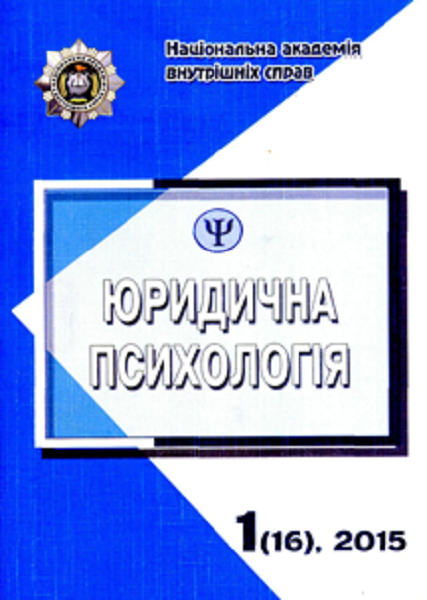Analysis of psychological determinants of readiness for lawyer creative thinking
Abstract
iness for lawyer creative thinking Creativity is a defining determinant of effective implementation process of lawyer’s enforcement practice. Thus, the leading direction of training the future lawyer is opening and activation of his creative potential.
The scientific article analyzes the experimental investigation of psychological determinant of readiness for lawyer’s creative thinking. The averaged profiles results of students of the law and psychological faculty are compared. Found that the profiles of lawyers and psychologists are differ. Lawyers are reticent and prudent in contrast to psychologists who show impulsiveness, energy and dynamic. Another important difference is that lawyers were more practical and realistic in comparison with psychologists, which have stability, empathy, compassion and understanding of others. There are volatility in the interests, lability, anxiety in lawyers. Psychologists instead have a greater emotional maturity and working capacity. However, lawyers are less emotional, attentive, assess people strictly, more anxious and vulnerable from the group of psychologists. Unfortunately we found absence of behavior in problem situations which stimulates the search for new innovative creative solutions in lawyers. Observed greater rigidity of existing settings and greater duration of getting rid of them in lawyers. Unlike psychologists who have more flexible ways of responding to the problem situation. It was found that the level of creativity of future lawyers is insufficient. An increased urgency of introduction the psychological measures of creative potential in the lawyers training system is substantiated.
Downloads
Abstract views: 126 PDF Downloads: 96
- Authors reserve the right to authorship of their own work and transfer to the magazine the right of the first publication of this work under the terms of the Creative Commons Attribution License, which allows other persons to freely distribute published work with mandatory reference to authors of the original work and the first publication of an article in this magazine.
- Authors have the right to enter into separate additional agreements on non-exclusive dissemination of the work in the form in which it was published in the journal (for example, to post an article in the institution's repository or to publish as part of a monograph), provided that the link to the first publication of the work in this journal is maintained.
- The journal's policy allows and encourages the posting of articles by authors on the Internet (for example, in electronic storehouses of institutions or on personal websites), both before the submission of this manuscript to the editorial office and during its editorial processing, as this contributes to the creation of a productive scientific discussion and positively affects the efficiency and dynamics of citing the published work.




